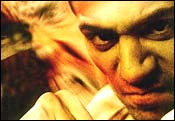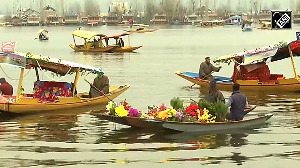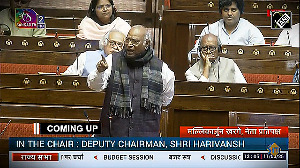The first question that comes to mind about the film I proud to be an Indian (besides the query on the grammar of the title) is, why a film on skinheads now? There are three possible answers:
 1. Sohail Khan is desperate for a hit and picked on a patriotic us-versus-the rest theme;
1. Sohail Khan is desperate for a hit and picked on a patriotic us-versus-the rest theme;
2. To catch on this present oeuvre of making Hindi/English films abroad with themes that cater to the NRIs so that even if a few thousands turn up, you have recovered your costs;
3. Perhaps to use the UK and skinheads as a metaphor for India and the anti-Muslim theme so prevalent in recent times.
The skinheads were a problem in the 1980s. A movie on them in 2004, when India is the rage in the West, when Bhangra Rap is an accepted musical genre in UK and Indian curry (whatever that is, since there obviously is nothing like an Indian curry) a UK dish, this movie just seems too out of date. There is nothing worse than retelling a story that is over and done with, unless there is something new to add.
| |||||||||||
Some parts of India too have a problem with immigrants (the bashing up of Bihari students seeking to give their exams in Maharashtra or Assam; the recent news about some Koli fisherfolk in Mumbai objecting to north Indians plying the trade simply because they do a better job of selling the fish door-to-door), are akin to the skinheads' dislike of Indians in the UK. It is, in many ways, a universal theme.
The other aspect explored in the film, about how some goras (whites) believe that people of a different colour (Indians) have no right to live in the UK also has clear parallels with India. Replace colour with religion -- where those of one religions believes that those following another faith have no right to live in this country -- and you get the drift.

Despite the richness of the idea, the screenplay simply does not develop either the plot or the individual characters sufficiently for one to empathise with the Indians. Something is lacking to make the situation believable, such as why does the family want to stay in the UK (the concept of growing roots is not sufficiently explored).
Sohail Khan, who doesn't have a name in the movie and is simply referred to as 'I' or 'that Indian boy', moves to London to take up residence with his brother and father, and comes across skinheads terrorising the Indian community. Since Sohail appears to believe more in taking the law into his own hands rather than non-violence, he bashes up the goons. This pretty much is the movie: Indians are the good guys, the white skinheads are the bad guys. And just in case you tarnish all whites as bad, the good cop is a white guy!
Like all formula Hindi films, there is the stuff about Hindu-Muslim unity and the leader of the skinheads, a huge, burly guy, called Cane (with clear Biblical overtones!). The last fight between I and Cane, fought with Indians rooting for I, is oh-so-typical: I initially loses, then his father, who had so far opposed violence, urges him to get up and fight, and he does, to clobber Cane. The cops, who arrive midway, arrest Cane only after the fight is over.
Incidentally, the London cops are shown as being fair and keen to arrest the skinheads and not biased towards the whites or prejudiced against the Indians, something that cannot be said for all the cops worldwide, including India.
Kulbhushan Kharbandha plays the weepy Punjabi father (he is getting quite fixed into this character, one saw him in the same role in Pinjar), but he slips into the role comfortably and his acting, as usual, is good. Sohail too is good but lacks the ability to emote well. Though he is well built, showing him take on a guy over a foot taller does appear that bit implausible.
 Asif Sheikh as the tormented elder brother does a good job, as do the other members of the family. In fact, the way the family is shown, living cosily in their home, is perhaps the most endearing part of the film. Hina, as I's girlfriend and Imran Ahmed, are okay but clearly have some distance to go as actors. Worse, their characters remain terribly underdeveloped in the film, as though inserted merely for India-Pakistani (or Hindu-Muslim) bhai-bhai effect.
Asif Sheikh as the tormented elder brother does a good job, as do the other members of the family. In fact, the way the family is shown, living cosily in their home, is perhaps the most endearing part of the film. Hina, as I's girlfriend and Imran Ahmed, are okay but clearly have some distance to go as actors. Worse, their characters remain terribly underdeveloped in the film, as though inserted merely for India-Pakistani (or Hindu-Muslim) bhai-bhai effect.
The good news is that at least a situation that Indians went through some decades ago has made it to the silver screen. It just needs to be depicted better, and sooner.
CREDITS
Cast: Sohail Khan, Hina, Imran Ahmed, Asif Sheikh, Mona Ambegaonkar, Kulbhushan Kharbanda
Director: Puneet Sira
Producer: Sohail Khan Productions
Music: K C Loy, Daboo Malik






 © 2025
© 2025